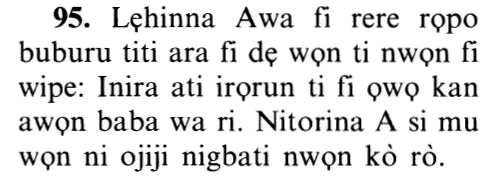7vs95
Select any filter and click on Go! to see results
ثُمَّ بَدَّلْنَا مَكَانَ السَّيِّئَةِ الْحَسَنَةَ حَتَّى عَفَواْ وَّقَالُواْ قَدْ مَسَّ آبَاءنَا الضَّرَّاء وَالسَّرَّاء فَأَخَذْنَاهُم بَغْتَةً وَهُمْ لاَ يَشْعُرُونَ
Thumma baddalna makana alssayyiati alhasanata hatta AAafaw waqaloo qad massa abaana alddarrao waalssarrao faakhathnahum baghtatan wahum la yashAAuroona
Yoruba Translation

Hausa Translation
Sa´an nan kuma Muka musanya mai kyau a matsayin mummũna, har su yi yawa, kuma su ce: "Cũta da azãba sun shãfi ubanninmu." ( Sai su kõma wa kãfirci). Sai Mu kãmã su kwatsam! alhãli kuwa sũ, bã su sansancħwa."
Asbabu n-Nuzuul (Occasions of Revelation)
ثُمَّ بَدَّلْنَا مَكَانَ السَّيِّئَةِ الْحَسَنَةَ ...
Then We changed the evil for the good,
Therefore, Allah changed the hardship into prosperity, disease and sickness into health and well-being, and poverty into richness in provision, so that they might be thankful to Allah for this, but they did none of that.
Allah's statement,
... حَتَّى عَفَواْ ...
until they `Afaw,
refers to increase in numbers, wealth and offspring.
Allah said next,
... وَّقَالُواْ قَدْ مَسَّ آبَاءنَا الضَّرَّاء وَالسَّرَّاء ...
... and they said: "Our fathers were touched with evil and with good.''
He tested them with this (afflictions) and that (ease and abundance) so that they may humble themselves and repent to Him. However, they failed both tests, for neither this nor that compelled them to change their ways.
They said, "We suffered Ba'sa' and Darra', but prosperity came afterwards, just as like our forefathers in earlier times.'' "Therefore,'' they said, "it is a cycle where we sometimes suffer a hardship and at other times, we enjoy a bounty.''
However, they did not comprehend Allah's wisdom, nor the fact that He is testing them in both cases. To the contrary, the believers are grateful to Allah in good times and practice patience in hard times.
In the Sahih, there is a Hadith that says;
عَجَبًا لِلْمُؤْمِنِ لَا يَقْضِي اللهُ لَهُ قَضَاءً إِلَّا كَانَ خَيْرًا لَهُ،
وَإِنْ أَصَابَتْهُ ضَرَّاءُ صَبَرَ فَكَانَ خَيْرًا لَهُ،
وَإِنْ أَصَابَتْهُ سَرَّاءُ شَكَرَ فَكَانَ خَيْرًا لَه
The matter of the believer is amazing, for nothing that Allah decrees for him, but it is better for him.
If a Darra' (harm) strikes him, he is patient, and this is better for him,
if he is given Sarra' (prosperity), he thanks (Allah) for it and this is better for him.
The believer, therefore, is aware of the test behind the afflictions whether it may be prosperity or adversity that Allah sends to him, as well as the blessings.
Similarly, in another Hadith,
لَايَزَالُ الْبَلَاءُ بِالْمُؤْمِنِ حَتَّى يَخْرُجَ نَقِيًّا مِنْ ذُنُوبِهِ،
The believer will continue to be tested by afflictions until he ends up pure from sin.
وَالْمُنَافِق مِثْله كَمَثَلِ الْحِمَارِ لَا يَدْرِي فِيمَ رَبَطَهُ أَهْلُهُ وَلَا فِيمَ أَرْسَلُوه
And the parable of the hypocrite is that of a donkey, it does not know why its owners tied it or released it.
Allah said next,
... فَأَخَذْنَاهُم بَغْتَةً وَهُمْ لاَ يَشْعُرُونَ ﴿٩٥﴾
So We seized them all of a sudden while they were unaware.
meaning, We struck them with punishment all of a sudden, while they were unaware.
A Hadith describes sudden death,
مَوْتُ الْفَجْأَةِ رَحْمَةٌ لِلْمُؤْمِنِ وَأَخْذَةُ أَسَفٍ لِلْكَافِر
Sudden death is a mercy for the believer, but a sorrowful punishment for the disbeliever.
قال " ثم بدلنا مكان السيئة الحسنة " أي حولنا الحال من شدة إلى رخاء ومن مرض وسقم إلى صحة وعافية ومن فقر إلى غنى ليشكروا على ذلك فما فعلوا وقوله " حتى عفوا " أي كثروا وكثرت أموالهم وأولادهم يقال عفا الشيء إذا كثر" وقالوا قد مس آباءنا الضراء والسراء فأخذناهم بغتة وهم لا يشعرون " يقول تعالى ابتليناهم بهذا وهذا ليتضرعوا وينيبوا إلى الله فما نجع فيهم لا هذا ولا هذا ولا انتهوا بهذا ولا بهذا قالوا قد مسنا من البأساء والضراء ثم بعده من الرخاء مثل ما أصاب آباءنا في قديم الزمان والدهر وإنما هو الدهر تارات وتارات بل لم يتفطنوا لأمر الله فيهم ولا استشعروا ابتلاء الله لهم في الحالين وهذا بخلاف حال المؤمنين الذين يشكرون الله على السراء ويصبرون على الضراء كما ثبت في الصحيحين " عجبا للمؤمن لا يقضي الله له قضاء إلا كان خيرا له إن أصابته ضراء صبر فكان خيرا له وإن أصابته سراء شكر فكان خيرا له" فالمؤمن من يتفطن لما ابتلاه الله به من الضراء والسراء ولهذا جاء في الحديث " لا يزال البلاء بالمؤمن حتى يخرج نقيا من ذنوبه والمنافق مثله كمثل الحمار لا يدري فيم ربطه أهله ولا فيم أرسلوه " أو كما قال ولهذا عقب هذه الصفة بقوله " فأخذناهم بغتة وهم لا يشعرون " أي أخذناهم بالعقوبة بغتة أي على بغتة وعدم شعور منهم أي أخذناهم فجأة كما في الحديث " موت الفجأة رحمة للمؤمن وأخذة أسف للكافر " .
"ثم بدلنا" أعطيناهم "مكان السيئة" العذاب "الحسنة" الغنى والصحة "حتى عفوا" كثروا "وقالوا" كفرا للنعمة "قد مس آباءنا الضراء والسراء" كما مسنا وهذه عادة الدهر وليست بعقوبة من الله فكونوا على ما أنتم عليه "فأخذناهم" بالعذاب "بغتة" فجأة "وهم لا يشعرون" بوقت مجيئه قبله
أي أبدلناهم بالجدب خصبا .
I'raab - grammatical analysis of the Qur'an
«ثُمَّ» حرف عطف.
«بَدَّلْنا» فعل ماض مبني على السكون و(نا) فاعله.
«مَكانَ» مفعوله الأول.
«السَّيِّئَةِ» مضاف إليه.
«الْحَسَنَةَ» مفعوله الثاني.
«حَتَّى» حرف غاية وجر.
«عَفَوْا» فعل ماض مبني على الضم المقدر على الألف المحذوفة لالتقاء الساكنين ، والواو فاعل. والمصدر المؤول من أن المضمرة بعد حتى والفعل في محل جر بحتى ، والجار والمجرور متعلقان بالفعل بدلنا ، وجملة بدلنا معطوفة.
«وَقالُوا» معطوف على عفوا.
«قَدْ» حرف تحقيق.
«مَسَّ آباءَنَا» فعل ماض ومفعول به.
«الضَّرَّاءُ» فاعل.
«وَالسَّرَّاءُ» عطف والجملة مقول القول.
«فَأَخَذْناهُمْ» فعل ماض وفاعله ومفعوله والفعل معطوف على عفوا.
«بَغْتَةً» حال أو نائب مفعول مطلق.
«وَهُمْ» ضمير منفصل في محل رفع مبتدأ. وجملة «لا يَشْعُرُونَ» في محل رفع خبر وجملة وهم لا يشعرون في محل نصب حال.
